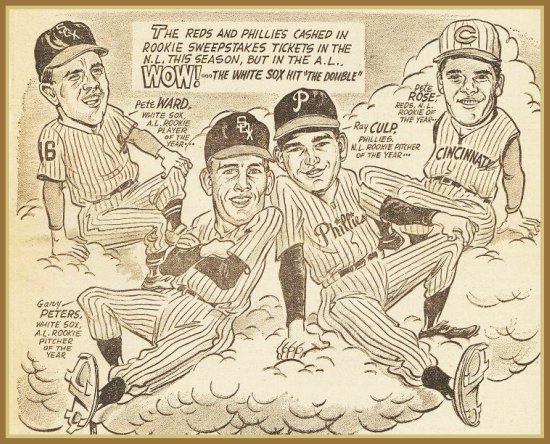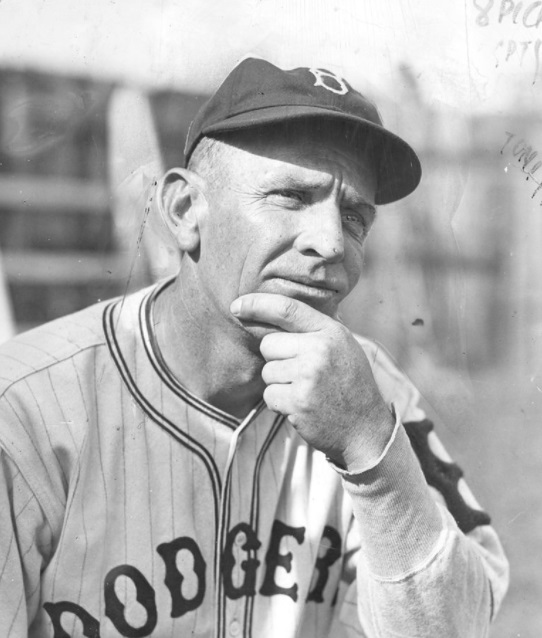July 30, 2016, marks the 126th anniversary of the birth of Casey Stengel, one of the truly legendary baseball figures of the twentieth century. First as a player and then as a manager, he was known as much for his ability as a baseball man as for Stengelese, the vocabulary and implausible brand of double talk that came out of his mouth. Red Smith once likened trying to understand Casey to “picking up quicksilver with boxing gloves.”
Many of the writers who covered him during his managerial years in New York (as Yankees skipper he won 10 pennants in 12 years, including five straight world championships followed by three dismal seasons with the expansion New York Mets) looked on Stengelese as “flagrant put-on.” Sportswriter Wells Twombly insisted, “He did it on purpose,” adding that Stengel was totally lucid and straightforward when unguarded but that he put on the act when the press was about.
Writing in Newsday the day after Stengel retired from baseball in 1965, George Vecsey had this to say about Stengelese, “He could have fun with it. When people from out-of-town gaped at him during the World Series, he turned on the Stengelese. It was what they had come for. When the radio and television poked their microphones in front of him, he turned on the Stengelese. He knew it made them mad. When the entire nation was watching him, he turned on the Stengelese. It was noblesse oblige.”
Whatever the truth of the matter, Stengelese is now a permanent fixture of baseball’s diverse language. For starters, it is important to know that Stengelese harbored its own vocabulary, which had to be mastered in order to comprehend the whole. Some key terms:
Butcher boy: A chopped ground ball, or as a verb, to chop down on the ball, to “butcher boy” it.
Embalmed: Sleeping.
Fairly amazing: Good.
Green pea: Rookie or player without seasoning.
Hold the gun: I want to change pitchers.
I shouldn’t tell you this but . . .
Words used to indicate that he was planting a story with a reporter.
Last night: The last game he managed even if it was the previous Saturday afternoon.
My writers: Sports reporters.
Ned in the third reader: Naiveté.
Road apple: Bum.
The Youth of America: Rookies.
He’s a remarkable . . . : A compliment.
***
Then, there were quotations. I have collected more than 200 examples; here are some of my favorites.
“About this autograph business. Once, someone in Washington sent up a picture to me and I wrote, ‘Do good in school.’ I look up; this guy is 78 years old.”
—As New York Yankees manager
“Ain’t it funny, Bill, how all of a sudden I got so smart and you got so dumb?”
—In 1949, after he had been named manager of the year and ran into the 1948 manager of the year, Billy Meyer. Quoted in the New York Journal American, October 9, 1960.
“Amazing strength, amazing power. He can grind the dust out of the bat. He will be great, super, wonderful. Now if he can only learn to catch a fly ball.”
—On Ron Swoboda as a new Met. Quoted by Maury Allen in The Incredible Mets.
“. . . and so you can say this tremendous and amazin’ new club is gonna be ready in every way tomorrow when the bell rings and that’s the name of my right fielder, Bell.”
—Finale to April press conference introducing the New York Mets in their debut year of 1962. Stengel had introduced all of his players but had been unable to recall the name of right-fielder Gus Bell. Quoted in Roger Angell’s Five Seasons.
“Been in this game a hundred years, but I see new ways to lose ’em I never knew existed before.”
—On the New York Mets when he managed the Mets.

“Can’t anybody here play this game?”
—His second or third most famous line was first posed as a question about the original New York Mets.
“Don’t cut my throat, I may want to do that later myself.”
—What he was alleged to have said to a barber. This line is one of the most oft-repeated in the lore of the game.
“Give ’em here. I’ll sign anything but veal cutlets. My ball-point pen slips on cutlets.”
—On autographs, quoted by Elston Howard in the October 1967 Reader’s Digest.
“He fields better on one leg than anybody else I got on two.”
—On an aging, injured Gil Hodges as a Met. Quoted in The Incredible Mets, by Maury Allen.
“He has it in his body to be great.”
—On the young Mickey Mantle. Quoted by Maury Allen in You Could Look It Up.
“He played first base and the outfield, pinch-hit, and did everything but collect tickets.”
—On the versatility of Tommy Byrne.
“He threw the ball as far from the bat and as close to the plate as possible.”
—On Satchel Paige.
“He was very brave at the plate. You rarely saw him fall away from a pitch. He stayed right in there. No one drove him out.”
—On Babe Ruth, quoted by Robert W. Creamer in Babe: The Legend Comes to Life.
“He’d fall in a sewer and come up with a gold watch.”
—On Yogi Berra quoted by Milton Gross in the August 1972 Baseball Digest.
“He’s dead at the present time.”
—Quoted by Berry Stainback, Sport, April 1966. Stengel is referring to Larry Gilbert.
“He’s throwing grounders.”
—On a pitcher who was wild and low.
“Hornsby could run like anything but not like this kid. Cobb was the fastest I ever saw for being sensational on the bases but he wasn’t a long hitter. They’re been a lot of fast men but none as big and strong as Mantle. He’s gonna be around a long time, if he can stay well, that fella of mine.”
—Early assessment of Mickey Mantle as the fastest slugger he ever saw. Hall of Fame Collection.
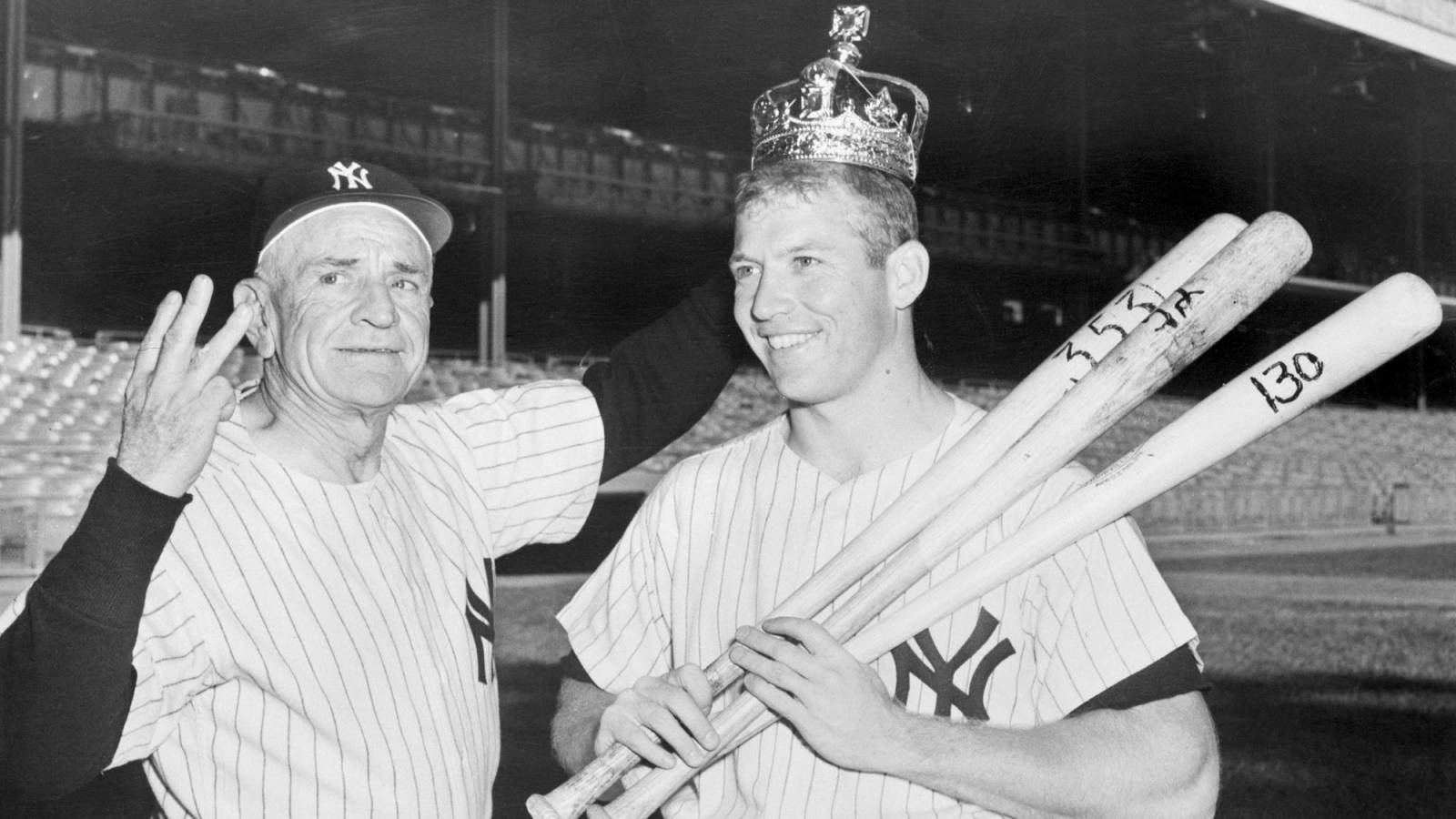
“How can a guy who’s so big and strong hit the ball so near?”
—On watching the immense Washington Senator Frank Howard take a mighty swing at a ball that dribbled into the infield. Quoted in Baseball Digest, March 1965.
“How the hell should I know? Most of the people my age are dead.”
—On being asked by a reporter what people “your age think of modern-day ballplayers or, depending on the source, being asked about his future. It appears to date from the spring of 1965.
“I broke in with four hits and the writers promptly decided they had seen the new Ty Cobb. It took me only a few days to correct that impression.”
—Widely attributed.
“I can make a living telling the truth!”
—Oft-used line according to George Vecsey, The New York Times, September 20, 1981.
“I couldna done it without my players.”
—On winning the 1958 World Series as Yankee manager.
“I came in here and a fella asked me to have a drink. I said I don’t drink. Then another fella said I hear you and Joe DiMaggio aren’t speaking and I said I’ll take that drink.”
—Before the 1951 All-Star Game, quoted in The Sporting News, 1955.
“I don’t know if he throws a spitball, but he sure spits on the ball.”
—On an opposing pitcher, as Yankees manager.
“I feel greatly honored to have a ballpark named after me, especially since I’ve been thrown out of so many.”
—In 1952 when the municipal ballpark in Glendale, his native town, was renamed Stengel Field. From an August 1985 AP story by Martha L. Willman.
“I got one that can throw but can’t catch, and one that can catch but can’t throw, and one who can hit but can’t do either.”
—On his three Mets catchers.
“I got players what got bad watches; they can’t tell midnight from noon.”
—On curfews, quoted by Red Roley of the New York Daily News in the Mets’ 1976 Scorebook.
“I had many years that I was not so successful as a ballplayer as it is a game of skill.”
—On his playing career, quoted in the Baseball Digest, June 1986
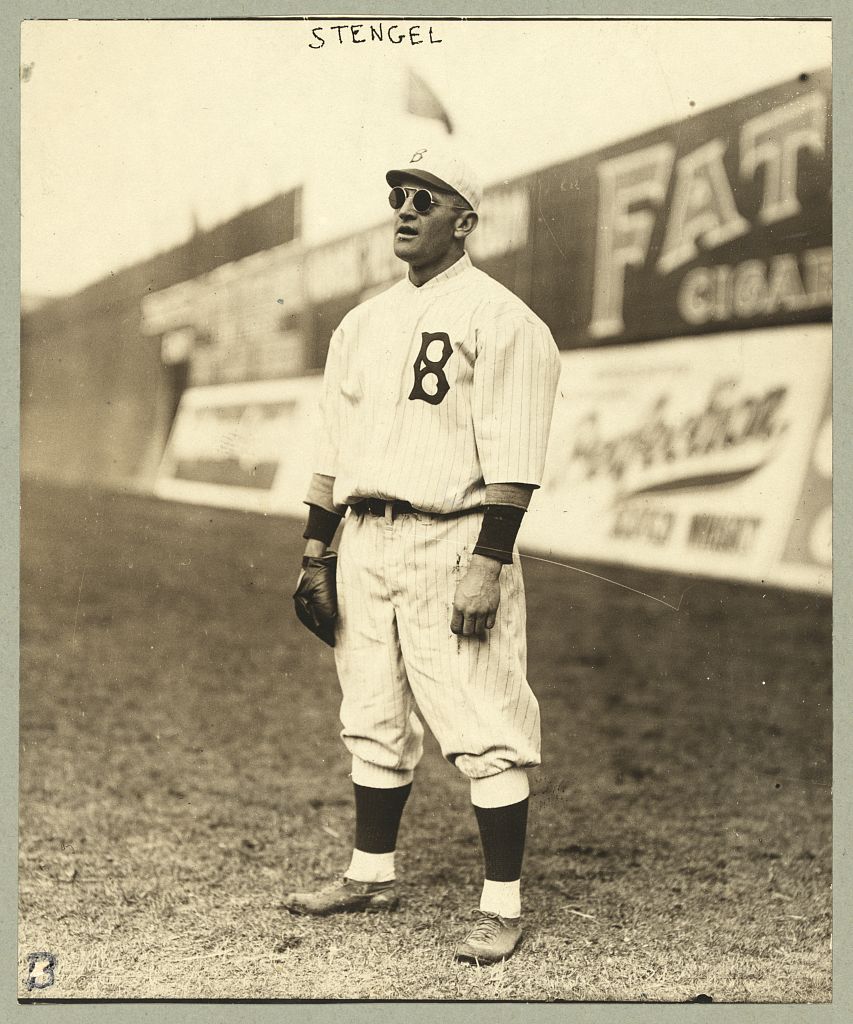
“Baseball is my very life, my one-consuming interest.”
—Quoted in The Sporting News, September 21, 1955.
“They said the spitter was filthy. Well, it wasn’t any Little Lord Fauntleroy pitch. Some of the hurlers really slobbered all over the leather. But it deserved a better fate and a better name.”
—Thanksgiving Day 1961, at the Macy’s Parade in New York, quoted in The Sporting News, December 6, 1961.
“I was such a dangerous hitter I even got intentional walks during batting practice.”
—Reminiscing, as Yankees manager, Hall of Fame.
“I’d be an astronaut. I love the moon.”
—When asked, at age 85, whether if he had his life to live over would he go into baseball again? Chicago Tribune, October 1, 1975.
“If I’m looking at you, you’re hitting . . .
If I’m walking away from you and spitting, you’re hitting . . .
If I’m looking at you and spitting, you’re NOT hitting . . .
If I’m walking away and not spitting, you’re NOT hitting.”
—Signs as recited by Dodger Frank Skaff just as he had been told by Stengel. Quoted in Dick Young’s column, New York Daily News, February 11, 1972. Skaff added: “Those are exactly what his signs were. I’ll never forget them. They give you an idea of why some of those guys were missing them.”
“If liking a kid who will never let you down in the clutch is favoritism, then I plead guilty.”
—On Billy Martin, quoted widely at the time of Martin’s death.
“If this keeps up I’m about to manage until I’m a hundred.”
—After the Mets enjoyed their first four-game winning streak. Quoted by Maury Allen in You Could Look It Up.
“If we’d had them when I was playing, John McGraw would have insisted that we go up to the plate and get hit on the head.”
—On batting helmets, quoted in The Sporting News, 1955.
“If we’re going to win the pennant, we’ve got to start thinking we’re not as good as we think we are.”
—Admonishing his Yankees, spring 1953.
“If you’re playing baseball and thinking about managing, you’re crazy. You’d be better off thinking about being an owner.”
—As New York Yankees manager.
“If you’re so smart, let’s see you get out of the Army.”
—Reply wired to a soldier who had cabled Stengel to criticize a strategic move. Quoted in The Sporting News, September 14, 1955.
“I’ll never make the mistake of being 70 again.”
—On announcing his retirement as manager of the New York Yankees in 1960, quoted in Norman MacLean, Casey Stengel: A Biography, 1976. Stengel liked the line so much that he repeated it for years to come in this form: “I was 70 years old, and I’ll never make the mistake of being 70 years old again.”
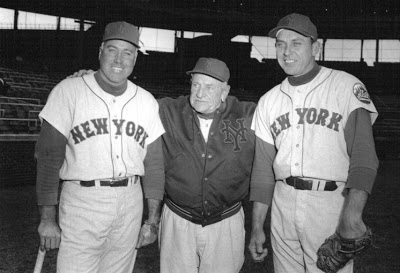
“I’m pleased to be managing the New York Knickerbockers.”
—At the California press conference announcing that he would manage the New York team, the Mets.
“It only helps them if they can play.”
—On players who didn’t drink. Quoted by Maury Allen in You Could Look It Up.
“It’s wonderful to meet so many friends that I didn’t used to like.”
—After playing in the 1971 Old-Timers Game at Cincinnati’s Riverfront Stadium. Many of the player’s old adversaries. Quoted in September 1971 Baseball Digest.
“Just when my fellows learn to hit in this ball park, they’re gonna tear it down.”
—As Mets manager, on the Polo Grounds, 1965.
“Kid, you’re too small. You ought to go out and shine shoes.”
—On Phil Rizzuto, as a Brooklyn tryout. Widely attributed.
“Let him hit ya, I’ll get you a new neck.”
—To a batter coming up with bases loaded, as Mets manager.
“Look at him. He doesn’t drink, he doesn’t smoke, he doesn’t chew, he doesn’t stay out late, and he still can’t hit .250.”
—On Bobby Richardson as Mets manager.
“Managing a team back then was a tough business. Whenever I decided to release a guy, I always had his room searched first for a gun. You couldn’t take any chances with some of them birds.”
—On managing the Brooklyn Dodgers in the 1930s.
“Managing is getting paid for home runs someone else hits.”
—The Macmillan Dictionary of Quotations.
“Mister that boy couldn’t hit the ground if he fell out of an airplane.”
—When he was managing the old Boston Braves and he was asked about the merits of a recruit whom he had sent away to the minors for further seasoning. Quoted in Baseball Digest, March 1972.
“Most ball games are lost, not won.”
—Widely quoted.
“Left-handers have more enthusiasm for life. They sleep on the wrong side of the bed and their head gets more stagnant on that side.”
—Widely attributed.
“Mungo and I get along fine. I just tell him I won’t stand for no nonsense—and then I duck.”
—As Dodgers manager on Van Lingle Mungo.
“Nah, I’m just the fella who plays him on TV.”
—When spotted by a fan in a hotel lobby by a man who asked, “Are you Casey Stengel?” Quoted by Maury Allen in You Could Look It Up.
“Nobody ever had too many of them.”
—On pitchers.
“Now, boys, I know you’re doing the best you can, and I’m not complaining about losing. But, gee, couldn’t you take a little longer doing it?”
—Comment to the Boston Braves, the worst pre-early Mets he ever managed. Quoted in H. L. Masin’s Baseball Laughs.
“Old-timers weekends and airplane landings are alike. If you can walk away from them, they’re successful.”
—As Dodgers manager.
“Right now we’re playing bad every place. Not hittin’, not pitchin’, and not fieldin’ too good. And judgin’ by what I read in the newspapers, the Yankee writers are in a slump, too.”
—After losing a string of nine games in 1953. Quoted in an AP biographical sketch, September 1, 1966.
“Sain don’t say much, but that don’t matter much, because when you’re out there on the mound, you got nobody to talk to.”
—On Johnny Sain, as Yankees manager, 1953.
“Say, I’ve got a tip on the market for you fellows. Buy Pennsylvania Railroad, because by tomorrow night about a dozen of you bums will be on it, riding in all directions.”
—To his 1921 Toledo Mud Hens after an extraordinarily shameful defeat when he found them in the clubhouse studying the financial pages. The team had many former major leaguers who had invested their money in stock. Quoted by David Cataneo in the Boston Herald, April 25, 1990.
“Shea Stadium has 54 restrooms, and I need one now.”
—Asked to say something about Shea Stadium by a comedian at Chicago’s Edgewater Beach Hotel who was trying to save his own act by introducing personalities in the audience.
“So what if DiMaggio doesn’t talk to me. He’s getting paid to play ball, and I’m getting paid to manage. If what I’m doing is wrong, my bosses will fire me. I’ve been fired lots of places before. He doesn’t get paid to talk to me, and I don’t either.”
—On Joe DiMaggio’s initial trouble accepting him. Quoted by Ira Berkow in The New York Times, April 15, 1981.
“Son, if you want to pitch in the major leagues, you’ll have to learn to catch those in your mouth.”
—To Yankee pitcher Mark Freeman who had just committed a balk because a fly flew in his eye, The New York Post, July 9, 1970.
“Son, we’d like to keep you around this season, but we’re going to try to win a pennant.”
—To a Yankee rookie.
“Sure holds the heat well.”
—After the 1966 All-Star Game in St. Louis, when the temperature hit 113 degrees on the field and someone asked him how he liked the new St. Louis ballpark. Quoted by Bill Freehan in Behind the Mask.
“Sure I played. Did you think I was born at age 70 sitting in a dugout trying to manager guys like you.”
—At age 72 when asked by Mickey Mantle if he had ever played ball.
“That game was so famous they never used me.”
—On the 14-inning 1916 World Series game in which Babe Ruth pitched for the Red Sox. Stengel was on the Dodgers’ roster but did not get to play. Quoted by Leonard Koppett, The New York Times, October 27, 1973.
“The altitude bothers my players at the Polo Grounds and that’s below sea level.”
—When asked before an exhibition game in Mexico City if the altitude bothered his players. Quoted in an AP piece, October 1, 1975.
“The man was either out too late or up too early.”
—On Don Larsen violating the Yankees midnight curfew and smashing a car into a tree during spring training, 1956. Quoted in It Takes Heart, by Mel Allen with Frank Graham, Jr.
“The secret of managing is to keep the guys who hate you away from the guys who are undecided.”
—Said on numerous occasions, widely quoted.
“The trick is growing up without growing old.”
—Quoted in Stengel: His Life and Times, by Robert W. Creamer.
“The trouble with women umpires is that I couldn’t argue with one. I’d put my arms around her and give her a little kiss.”
—Time, August 11, 1975.
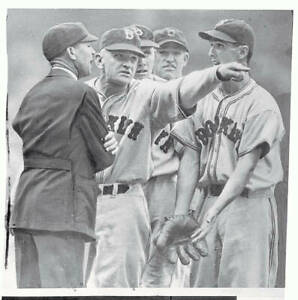
“The way our luck has been lately, our fellows have been getting hurt on their days off.”
—As New York Mets manager, 1962.
“Then I’d have two languages I couldn’t speak, French and English both.”
—When Jim Fanning of the Expos asked Casey Stengel why he never visited Montreal, quoted in Baseball Digest, March 1971.
“There comes a time in every man’s life, and I’ve had plenty of them.”
—One of his most quoted lines—these are the words that ultimately marked his grave at Forest Lawn Memorial-Park in Glendale.
“There’s never been anyone like this kid which we got from Joplin. He has more speed than any slugger and more slug than any speedster—and nobody has ever had more of both of them together.”
—On Mickey Mantle early in Mantle’s career quoted by Bob Deindorfer in Baseball Stars of 1963.
“They brought me up to the Brooklyn Dodgers, which at that time was in Brooklyn.”
—As Mets manager, 1962, Hall of Fame.
“They say he’s funny. Well, he has a lovely wife and family, a beautiful home, money in the bank, and he plays golf with millionaires. What’s funny about that?”
—On Yogi Berra, widely attributed.
“They say some of my stars drink whiskey, but I have found that the ones who drink milkshakes don’t win many ball games.”
—As Yankees manager, widely quoted.
“This baseball is a funny game. Just as I start telling people, ‘We’re making slow but sure improvements,’ bop, we slide back again.”
—After his 50–112 1965 season with the Mets. Quoted in Baseball as I Have Known It, by Fred Lieb.
“This club plays better baseball now. Some of them look fairly alert.”
—In 1969, still a fan, on his Mets.
“Up there, people are beginning to talk.”
—Pointing to the stands and responding to a pitcher asking why he had to come out of a game. Quoted in the New York Journal-American by Max Kase, October 9, 1960.
“Wake up, muscles—we’re in New York now.”
—To himself in 1921 on entering the Polo Grounds after being traded to the Giants by the Phillies.
“We was going to get you a birthday cake, but we figured you’d drop it.”
—To Marvelous Marv Throneberry, on Stengel’s birthday when Throneberry asked why he had not gotten a cake on his birthday. Quoted by Arthur Daley in The New York Times, July 16, 1976.
“Well, that’s baseball. Rags to riches one day and riches to rags the next. But I’ve been in it 36 years and I’m used to it. Just stay calm and take things in stride.”
—Quoted in The Sporting News, November 3, 1948.
“Well, we’ve got this Johnny Lewis in the outfield. They hit a ball to him yesterday, and he turned left, then he turned right, then he went straight back and caught the ball. He made three good plays in one. And Greg Goosen, he’s only 20 and with a good chance in 10 years of being 30. . . .”
—When asked about his team on The Today Show.
“Well, you know my home town is Kansas City, Missouri, so a number of people when I started out in baseball called me Casey for Kansas City, and then there was the old story of Casey at the Bat and I struck out a number of times on my first two years that I played ball, and I received the name from that strike out Casey.”
—Asked about his nickname in a February 2, 1944, Armed Forces Radio Service interview.
“We’ve got to learn to stay out of triple plays.”
—When asked whether he had any thoughts on next year, after the Mets had ended their season hitting into a triple play.
“What do ya think, I was born old?”
—Stengel when he astounded Mickey Mantle by showing him how to play the right field wall at the old Ebbets Field. Quoted in” Memories of Casey—and Stengelese,” The San Francisco Examiner, September 30, 1975.
“When a fielder gets the pitcher into trouble, the pitcher has to pitch himself out of a slump he isn’t in.”
—From The Gospel According to Casey, by Ira Berkow and Jim Kaplan.
“When I first played the game they couldn’t play on the Sabbath because that was the preachers’ day to collect. I still remember my first game against Babe Ruth and that day he hit two over my head and then I knew who Babe Ruth was.”
—During his rambling 20-minute acceptance speech on induction to the baseball Hall of Fame, July 25, 1966. He concluded that speech by saying: “We appreciate every boys’ group, girls’ group, poem, and song. And keep goin’ to see the Mets play.”
“When I played in Brooklyn, I could go to the ball park for a nickel carfare. But now I live in Pasadena, and it costs me $15 or $16 to take a cab to Glendale. If I was a young man, I’d study to become a cab driver.”
—Widely quoted.
“Why has our pitching been so great? Our catcher, that’s why. He looks cumbersome, but he’s quick as a cat. He springs on a bunt like it was another dollar. And nobody’s ever gonna have to throw a benefit for him neither. Money is the last thing he thinks about at night before he goes to sleep. . . . To me, he is a great man.”
—On Yogi Berra, quoted in an article by Ira Berkow on a play about Stengel, The New York Times, April 15, 1981.
“With the salary I get here, I’m so hollow and starving that I’m liable to explode like a light bulb if I hit the ground too hard.”
—As a Pittsburgh Pirates outfielder, explaining to his manager why he didn’t slide, recalled in many interviews.
“You could look it up.”
—Tag line to many of his stories, statistics, and claims. This is how The New York Times regarded the line in an October 19, 1960, “Man in the News” profile: “So remarkable is his memory that he has virtually total recollection of each encounter. ‘You can look it up,’ he’ll say to doubters. They do and doubt no longer.”
“You couldn’t play on the Amazin’ Mets without having held some kind of record, like one fella held the world’s international all-time record for a catcher getting hit on the ankles.”
—As Mets manager, 1967.
“You have to draft a catcher, because if you don’t have one, the pitch will roll all the way back to the screen.”
—On why his first draft choice as New York Mets manager was an unknown catcher.
“You got to get twenty-seven outs to win.”
—With the Yankees.
“You look there into the Cincinnati dugout and what do you see? All mahogany. Then you look at our bench and all you see is driftwood.”
—On his Mets, on a day they played the Reds.
